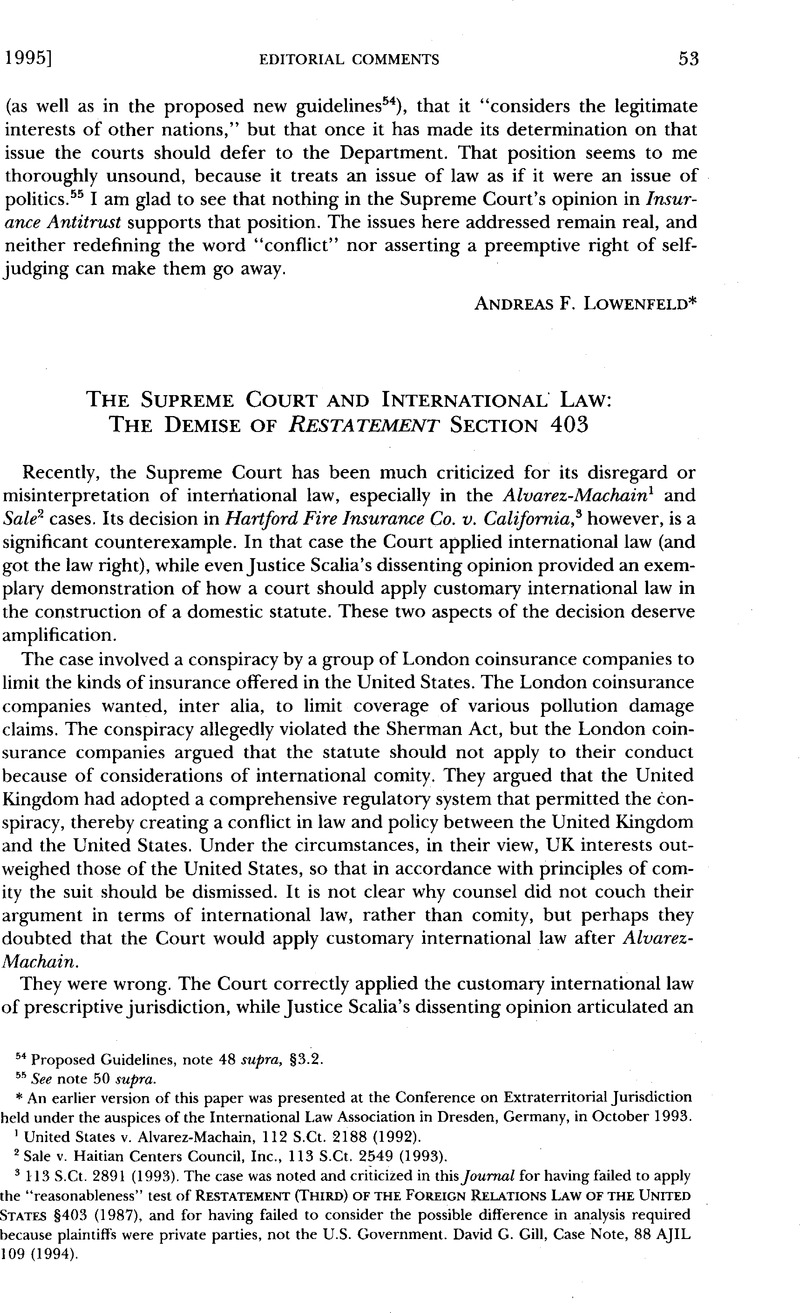Article contents
The Supreme Court and International Law: The Demise of Restatement Section 403
Published online by Cambridge University Press: 27 February 2017
Abstract

- Type
- Editorial Comments
- Information
- Copyright
- Copyright © American Society of International Law 1995
References
1 United States v. Alvarez-Machain, 112 S.Ct. 2188 (1992).
2 Sale v. Haitian Centers Council, Inc., 113 S.Ct. 2549 (1993).
3 113 S.Ct. 2891 (1993). The case was noted and criticized in this Journal for having failed to apply the “reasonableness” test of Restatement (Third) of the Foreign Relations Law of the United States §403 (1987), and for having failed to consider the possible difference in analysis required because plaintiffs were private parties, not the U.S. Government. David G. Gill, Case Note, 88 AJIL 109 (1994).
4 justice Scalia was joined by Justices O’Connor, Kennedy and Thomas. 113 S.Ct. at 2917. The dissent also articulated a clear analytical distinction between the questions (1) whether the courts have subject matter jurisdiction (because the claim arises under federal law), and (2) whether the Sherman Act applies. Scalia concluded that the courts have subject matter jurisdiction even if the Sherman Act, properly construed, does not apply (so that the federal law supporting subject matter jurisdiction in the first place disappears). The practical consequence of this analytical distinction is that the case would be dismissed on the merits and not for lack of subject matter jurisdiction. Hence, the decision would presumptively be res judicata throughout the world, although it could always be rendered ineffective by measures like the UK clawback statute, which provides, inter alia, that antitrust damage awards are unenforceable in the United Kingdom. See Lawrence Collins, Blocking and Clawback Statutes: The United Kingdom Approach—77, 1986 J. Bus. L. 452.
5 113 S.Ct. at 2919 (quoting Murray v. The Charming Betsy, 6 U.S. (2 Cranch) 64, 118 (1804) (Marshall, C.J.)).
6 Id.
7 Id.
8 Id. at 2919–20 (citing Sale, 113 S.Ct. at 2562 n.35).
9 See note 3 supra.
10 Id. at 2920–21.
11 148 F.2d 416 (2d Cir. 1945).
12 Both opinions cited Continental Ore Co. v. Union Carbide & Carbon Corp., 370 U.S. 690, 704 (1962); and Matsushita Elec. Indus. Co. v. Zenith Radio Corp., 475 U.S. 574, 582 n.6 (1986) (“The Sherman Act does reach conduct outside our borders, but only when the conduct has an effect on American commerce.”).
13 Phillip R. Trimble, A Revisionist View of Customary International Law, 33 UCLA L. Rev. 665 (1986).
14 S.S. Lotus (Fr. v. Turk.), 1927 PCIJ (ser. A) No. 10.
15 See Agreement Relating to Mutual Cooperation Regarding Restrictive Business Practices, June 23, 1976, U.S.-Ger., Art. 2(2), 27 UST 1956, 15 ILM 1282 (1976) (covering “restrictive business practices which, regardless of origin, have a substantial effect on the domestic or international trade of [the] other party”); and Roger P. Alford, The Extraterritorial Application of Antitrust Laws: The United States and European Community Approaches, 33 Va. J. Int’l L. 1, 28–29 (1992) (pointing out that the European Commission accepted the effects doctrine, while the European Court of Justice achieved the same result by expanding the “objective territoriality” principle).
16 The U.S. Court of Appeals for the District of Columbia Circuit recently dealt with a similar clash of antitrust policy between the United States and the United Kingdom, and concluded that “there is no evidence that interest balancing represents a rule of international law.” Laker Airways v. Sabena, Belgian World Airlines, 731 F.2d 909, 950 (D.C. Cir. 1984).
17 American Banana Co. v. United Fruit Co., 213 U.S. 347 (1909).
18 Timberlane Lumber Co. v. Bank of America, 549 F.2d 597 (9th Cir. 1976).
19 Foreign Trade Antitrust Improvement Act of 1982, 15 U.S.C. §6a (1988).
20 H.R. Rep. No. 686, 97th Cong., 2d Sess. 13 (1982).
21 See U.S. Sues British in Antitrust Case, N.Y. Times, May 27, 1994, at A1.
22 113 S.Ct. at 2909.
23 Id. at 2910–11.
24 E.g., Agreement Regarding the Application of Competition Laws, Sept. 23, 1991, U.S.-Eur. Comm’n, 30 ILM 1487 (1991). The United States also has relevant agreements with Germany, Canada and Australia.
- 3
- Cited by


